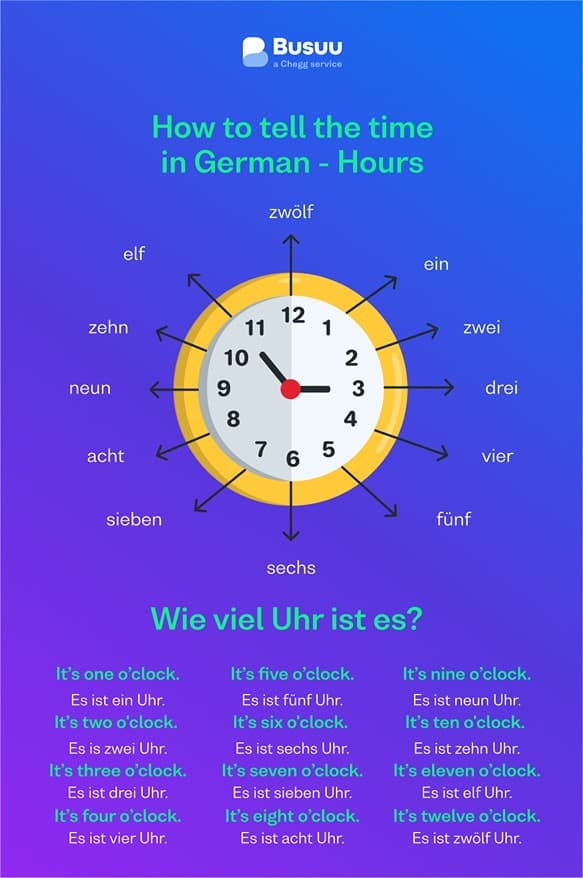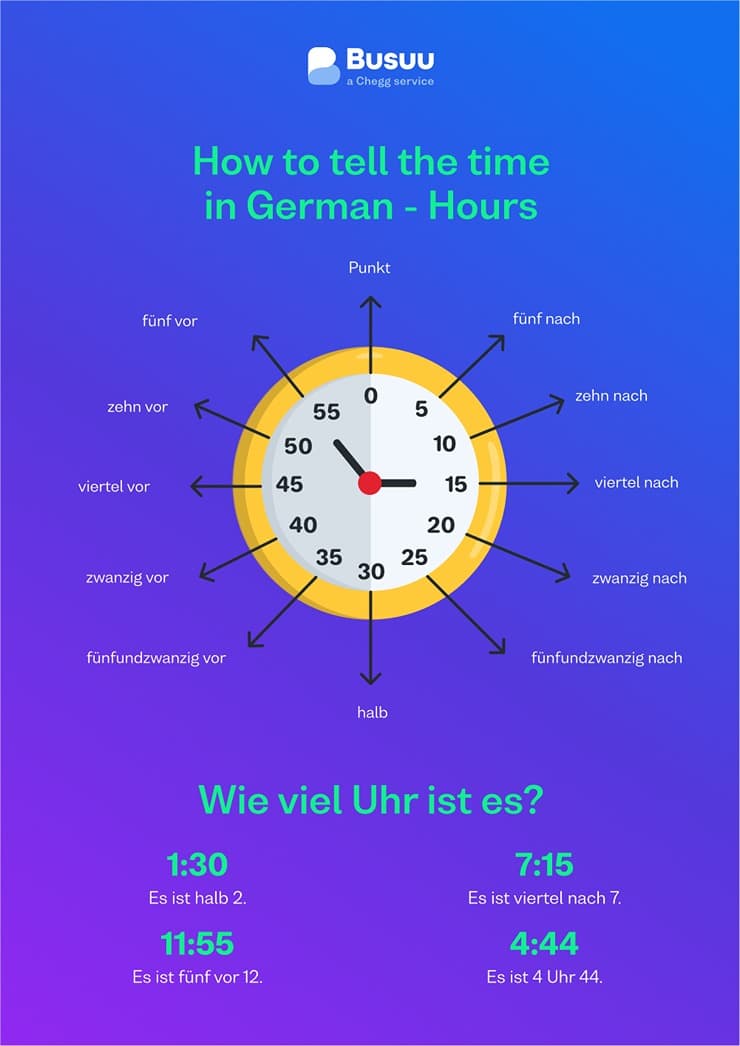I want to learn...
Lieber spät als nie– Better late than never!
This is something you might already know, but punctuality is of immense importance in German culture. Being on time to a meeting actually means getting there 10 minutes beforehand just to make sure you’re ready to go. In the German culture tardiness is no laughing matter. To many Germans, being on time is considered a sign of respect towards other people’s time. That being said, it’s key for learners of the German language to master this concept in order to avoid any potential pitfalls when immersing yourself in German culture.
Telling the time is important in most cultures, and telling the time in German offers no exception. Having a firm grasp on how to tell the time in German allows you to function in a German-speaking environment and avoids potential confusion.
Let’s get started now and we’ll make sure you increase your knowledge on all of the following:
● What do you need to say in German to ask for the time
● What you need to know and understand to tell the time in German
● The intricacies of German punctuality
Los geht’s!– Let’s go!
Note: We're only covering the German spoken in Germany in this article, and not in other German-speaking countries, which may present some subtle differences.
Knowing how to ask for the time in German
At this point in your studies of the language, you’ve likely encountered the most common phrases in German. We’ll focus on the most important phrases when it comes to learning the time:
●Wie viel Uhr ist es?– What time is it?
●Wie spät ist es?– What time is it?
So if you find yourself walking through the streets of Munich and you’d like to know what time it is, you could ask someone:
●Entschuldigung, wie viel Uhr ist es?– Excuse me, what time is it?
●Können Sie/kannst du mir sagen, wie spät es ist?– Could you tell me what time it is?
Depending on your pronunciation and confidence in your German skills, the person is likely to hold their watch so you can see the time. If this is not what they do and they tell you the time out loud, you’ll be ready to understand them by continuing to read this post.
How to tell the time in German
Telling the time has its challenges in German, but read on for some awesome tips and tricks to make this learning experience a breeze.
● We use the verb“sein” (to be) when saying what time it is.
● So, we give the time using “es ist...”(it is...o’clock).
Here is the full list of all the hours in German:
● It’s one o’clock. –Es ist ein Uhr.
● It’s two o'clock. –Es is zwei Uhr.
● It’s three o’clock. –Es ist drei Uhr.
● It’s four o’clock. –Es ist vier Uhr.
● It’s five o’clock. –Es ist fünf Uhr.
● It’s six o’clock. –Es ist sechs Uhr.
● It’s seven o’clock. –Es ist sieben Uhr.
● It’s eight o’clock. –Es ist acht Uhr.
● It’s nine o’clock. –Es ist neun Uhr.
● It’s ten o’clock. –Es ist zehn Uhr.
● It’s eleven o’clock. –Es ist elf Uhr.
● It’s twelve o’clock. –Es ist zwölf Uhr.

When we speak German, we typically use the 12-hour clock, which is considered less formal. However, the 24-hour clock is much more common when you encounter times in written German. When you learn German, you should keep in mind that it does not use the AM or PM distinction.
You can use one of the following phrases to avoid any confusion:
● morgens – in the morning. This is any time before noon. For example: Ich gehe morgens um acht Uhr in die Schule.
● nachmittags – in the afternoon. This refers to any time after noon. For example: Ich spiele um drei Uhr nachmittags Tennis.
● abends – in the evening. Abends refers to the evening hours. Example: Ich gehe um sechs Uhr abends Eis essen.
● nachts – at night. This refers to any hours during the night. Example: Ich gehe nachts um elf Uhr ins Bett.
You also need to know that 12:00 noon and 12:00 at night are referred to as Mittag and Mitternacht, respectively.
● Mittag – midday/noon (note that, as an indication of time, no article is needed)
● Mitternacht – midnight (please note that, as an indication of time, no article is needed)
Here are a few other key words that are essential to understand when it comes to time:
● um – Is equal to the English word “at” and signifies when exactly you are doing something, such as:“Wir treffen uns um vier Uhr” (We are meeting at four).
● And the word we use to ask about the time in German is “wann?”
○ Example: Wann essen wir Kuchen? --- Um ein Uhr nachmittags.
Moving on to the German minutes
The hours on their own won’t get you all you need. Read on to learn how to say the minutes in German:
The words nach (after) and vor (before) are used to state a specific time in German.
●fünf nach– five past
●zehn nach– ten past
●viertel nach– quarter past
●zwanzig nach– twenty past
●fünfundzwanzig nach– twenty-five past
●halb– half an hour before – 8:30 would be halb neun. This case is particular to German.
●fünfundzwanzig vor– twenty-five to
●zwanzig vor– twenty to
●viertel vor– quarter to
●zehn vor– ten to
●fünf vor– five to
●Punkt– exactly/o’clock
Check out these examples:
● It’s 1:30. –Es ist halb 2.
● It’s 7:15. –Es ist viertel nach 7.
● It’s 11:55. –Es ist fünf vor 12.
A good trick that works whenever you are in doubt is to just read the numbers one-by-one as they appear on the clock.
● It’s 3:12. –Es ist 3 Uhr 12.
● It’s 4:44. –Es ist 4 Uhr 44.
● It’s 11:58. –Es ist 11 Uhr 58.

Pro tips for talking about time in German
In German, we usually say the time by starting off with the hour, followed by the word Uhr (o’clock), followed by the respective number of minutes. As you learned above, written and some spoken German prefer to use the 24-hour clock, which can be a bit confusing when you are first starting off on your German time journey. Also, don’t forget to check the proper German pronunciation of words used to tell the time.
Example: 5 in the afternoon would be 17:00 Uhr and 9 at night would be 21:00 Uhr.
As always, practice makes perfect.
Knowing how to tell the time in German is only half the battle. Continue learning and immerse yourself in German culture!
Newlanguages


